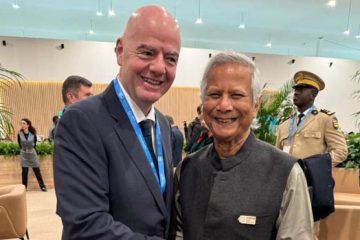Female referees and 26-man squads will feature for the first time at the Qatar World Cup
Sports Desk : dhakamirror.com
The 2022 FIFA World Cup for men is quickly approaching. It has been almost 12 years since Qatar was awarded hosting rights for the tournament, and on November 20, the first game will kick off.
Qatar will make history as the first country in the Middle East to host football’s biggest tournament, which will feature 32 teams and draw more than 1.2 million visitors.
As for more historical firsts at this year’s World Cup, here are a few to consider:
Technology used for offside
The Federation Internationale de Football Association (FIFA) announced in July that a semi-automated offside system would be used at the World Cup to facilitate quick and accurate offside calls.
If “any part of the head, body, or feet is in the opponents’ half (excluding the halfway line), and any part of the head, body, or feet is nearer to the opponents’ goal line than both the ball and the second-last opponent,” the player is considered to be in an offside position.
With the help of a sensor embedded in the ball and a limb-tracking camera system, the technology is able to track the players’ every move. The information will be used to project 3D images onto stadium screens to help spectators and viewers at home better understand the referee’s decision.
Substitutions
In contrast to the 2018 World Cup in Russia, where teams were limited to three substitutions per game, this tournament will allow for five.
The rule was implemented in 2020 after “a global analysis of the ongoing impact of COVID-19 on football as well as representations from several key stakeholders across the football community,” according to the International Football Association Board, the organization responsible for formulating football’s rules.
The World Cup rules allow for an extra substitution if the game goes into overtime.
Over the course of the last two years, several different football leagues, including Spain’s La Liga and Major League Soccer in the United States, have adopted the new rule.
Beginning in November
In contrast to previous tournaments, Qatar 2022 will be held in the winter months of November and December.
World Cup tournaments were traditionally played in June and July, the height of summer in the Northern Hemisphere. The decision was made to avoid the extreme heat that can reach 50C (122F) in Qatar at that time of year.
Temperatures are expected to range from 14 to 31 degrees Celsius throughout the tournament (57F to 88F).
Teams have been enlarged
In November, each participating country will announce their World Cup squad, which can have up to 26 players. This is three more than the limit set by FIFA for the 2018 World Cup in Russia.
Due to the “unique timing” of the tournament in November and disruptions caused by the COVID-19 pandemic, FIFA decided to make the change.
In addition, the original cap of 35 players was raised to 55 for the World Cup’s preliminary squad list.
Referees who are women
Qatar 2022 will be the first men’s World Cup to feature female referees, with three women among the tournament’s total of 36.
UEFA Super Cup and Africa Cup of Nations referees Stephanie Frappart (France), Yoshimi Yamashita (Japan), and Salima Mukansanga (Rwanda) all have experience working men’s tournaments.
Frappart believes that the presence of female referees is “a strong sign from FIFA and the authorities” in the country. “I’m not a feminist spokesperson, but if this can make things happen…”
Three additional women will join them as part of the 69 assistant referees.
A most compact World Cup
Qatar, at just over 11,500 square kilometers (4,440 square miles), will be the smallest country to ever host FIFA’s marquee event.
There are eight venues, and all of them are within a 50km (31-mile) radius of Doha, the capital. Most days will feature as many as four games during the group stages.
Although Qatar and FIFA claim that the “compact” nature of the tournament will allow fans to see multiple games per day, opponents have voiced concerns that the arrival of over 1.2 million visitors could cause traffic jams and make it difficult for people to move around the country,
“Having four matches in a day is a challenge in a city like Doha,” Abdulaziz Ali Al-Mawlawi, of the Supreme Committee for Delivery and Legacy, said last month. “… Of course, we are expecting to have congestion on the streets.”
Qatar has decided to keep its schools closed and to reduce office hours throughout the period of the World Cup.




















